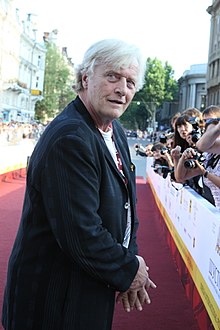Rutger O. Hauer [1944]
Of all the Dutch film stars since the beginning of the film making age, Rutger Hauer must be considered to be the most prolific and successful performer of all Dutch actors or actresses. He was and is not only the top movie star in his native the Netherlands, but since his United States film debut in 1981, he has become a notable American actor as well. Hauer moved permanently to the United States in 1985, and since that time has done most of his work there, although he also actively participates in Dutch, British and international film making activities.
Hauer became the major Dutch movie actor in 1973, with his role in “Turkish Delight”, a Dutch language movie which was directed by the noted Dutch American film director, Paul Verhoeven. A few years later, in 1979, he solidified his position as a noted actor in his role in the Dutch language film, “Soldier of Orange”, a movie about the Dutch resistance during the Second World War. Both of the above films were also shown in the United States with English subtitles, and did receive considerable attention in the American market.
Following considerable success in his native country, Hauer entered the international movie making scene. He made his British debut in 1975 in “The Wilby Conspiracy”, a film set in South Africa with well known international actors Michael Caine and Sidney Poitier. Hauer’s role was a supporting one and he received little publicity from it.
Hauer’s American debut was made, in 1981, in the Sylvester Stallone film, “Nighthawks”. The following year, in 1982, Hauer appeared in the science fiction film, “Blade Runner”. This role gave Hauer an important and visible role as an eccentric, violent and sympathetic character in this thriller movie. Subsequently Hauer would appear in numerous other American productions. The three most notable ones were in television series. In 1987, he appeared in a major role in “Escape from Sobibor”, for which he won considerable recognition including the Golden Globe Award. In 1994, he appeared in “Fatherland”, in which he played a role that gave him a Golden Globe nomination for his acting. And in 2005, Hauer appeared in “The Poseidon Adventure”, another television series.
Hauer received most of his acting recognition in his own native country, the Netherlands, and at noted film festivals. Below follow the awards Hauer received over the years of his professional acting career. Hauer’s first major award was the Golden Calf Award, in 1981, for Best Actor in the Netherlands. In 1988, he received the Golden Globe Award as noted above, and in that same year he also received the Best Actor Award at the Seattle Film Festival for his role in “The Legend of the Holy Drinker”.
There was a gap of six years until the next award appeared. In 1994, Hauer received the Golden Globe nomination for his role in “Fatherland”, an HBO television production. The following year, in 1995, the Dutch Post Office issued a stamp portraying Hauer for his role in “Turkish Delight”, his first major film. And in 1997, Hauer received the Rembrandt Award, the Dutch version of the People’s Choice Award.
Hauer’s major recognition from his fellow Dutchmen is probably the award he received in 1999. It was the Dutch Actor of the Century Award, a national recognition of his acting performances during the twentieth century. In 2001, Hauer received the Carte Noir Award from at the 16th Festival du Film in Paris, France. And in 2004, Hauer received the Golden Heron Career Award at the Montecatini Film Festival in Italy.
The next two awards Hauer received were both for his career achievements. In 2005, he received the Career Achievement Award at the Malaga Film Festival in Malaga, Spain, and also the 2005 Career Achievement Award at the Sarasota Film Festival in Florida. And the last reported award he received, in 2008, was the Golden Calf Culture Award, a national recognition in his native country, the Netherlands. So based on the above one can observe that Hauer’s achievements have not gone unnoticed, especially not in his native country.
Rutger Hauer was born in Breukelen, the Netherlands on January 23, 1944, but grew up in Amsterdam. His parents were Arend and Teuneke Hauer, both active professional people engaged in their careers as art teachers. Rutger had difficulty settling down during his younger years. He was quite adventurous and traveled over the world as a deckhand on a freighter for a year, served in the Dutch Army for a while, and held a number of low level jobs before deciding on an acting career. He attended art classes, joined an experimental theater group, with which he stayed for five years. He first received recognition for his role in a successful Dutch television series, “Floris”, in 1969. This first major role made him famous in his native country, the Netherlands, and launched him on his professional career detailed above.
REFERENCES
Rutger Hauer, http://www.rutgerhauer.org/biography/biography.php
Rutger Hauer, http://en.wikipedia.org/wiki/Rutger_Hauer
Dutch-American actor Rutger Hauer writes his memoirs, http://www.godutch.com/newspaper/index.php?id=808
E-BOOKS AVAILABLE FROM AMAZON; GOOGLE: Kindle Store Pegels
PROMINENT DUTCH AMERICANS, CURRENT AND HISTORIC
EIGHT PROMINENT DUTCH AMERICAN FAMILIES: THE ROOSEVELTS, VANDERBILTS AND OTHERS, 2015
FIFTEEN PROMINENT DUTCH AMERICAN FAMILIES: THE VAN BURENS, KOCH BROTHERS, VOORHEES AND OTHERS, 2015
PROMINENT DUTCH AMERICANS IN U.S. GOVERNMENT LEADERSHIP POSITIONS, 2015
DUTCH PEGELS INVOLVED IN WARS
ALLIED EUROPE CAMPAIGN—1944/1945: TACTICAL MISTAKES, 2017
THE SECOND WORLD WAR IN THE NETHERLANDS: MEMOIRS, 2017
FRENCH REVOLUTION, NAPOLEON AND RUSSIAN WAR OF 1812, 2015








